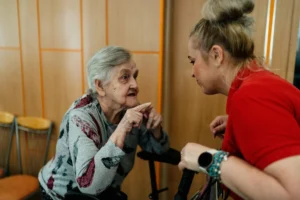Also known as continuing care, complex care is a form of personalised assistance for individuals with complex needs. These needs may be the result of a lifelong condition, or they may have developed following an accident or illness. From managing chronic conditions to supporting those with disabilities, complex care plays a vital role in enhancing the quality of life for these individuals, allowing them to live independently and be as fulfilled as possible.

In this blog, we’ve taken a closer look at what complex care involves and the different types of care that are available. Explore our full Complex Care offering here.

For more information about the complex care services we provide, please get in touch with the Aspire UK team today.
Who May Need Complex Care?
The types of people who may require complex care are broad, but may include:
- The elderly (particularly those with multiple age-related health issues, can also include use of stomas, cough assistance, gastrostomy feeding, catheters, tracheostomies, nebulisers etc).
- Adults with severe physical or learning disabilities.
- Children with long-term health conditions or disabilities from birth.
- People with long-term health conditions (such as diabetes or neurological disorders).
How is Complex Care Delivered?
Complex care can be delivered in various settings, depending on the specific needs of the individual and their family.
- Domiciliary care (when individuals receive care and are supported to remain in the comfort of their own home, including assistance with daily activities, medication management and medical care).
- Community care (when services are delivered in the local community rather than a hospital or home setting, such as a day centre or nurse program).
- Residential care (when individuals are unable to remain at home they may enter a nursing home or specialist care home to receive 24/7 care and support).
Types of Complex Care
Several services fall under the complex care umbrella, including:
Dementia Care
Did you know that one in three people over the age of 65 will develop a form of dementia? Up until a few years ago, an individual suffering from dementia would have entered a nursing or specialist care home so that they could be provided with round-the-clock support; these days, complex care services enable them to remain in their own home.
Post Stroke Care
A stroke can be a life-changing experience – both for the individual and for their family. Returning home afterward can pose all sorts of challenges, as an individual navigates having to relearn everything that was once familiar. Complex care can make a world of difference on the road to recovery, ensuring that they are supported to reach their goals.
Palliative Care
Many who are faced with a serious terminal illness prefer to remain at home rather than go into hospice. Complex care enables a highly trained care assistant to help ease the individual’s pain and suffering, support them in continuing to live as independently as possible, and provide emotional support for the individual and their family.
Epilepsy Care
A chronic neurological disorder, epilepsy can affect individuals at any age and is far more common than people think (affecting nearly one in 100 people here in the UK). Complex care can provide a compassionate and knowledgeable support network that can help individuals navigate their epilepsy diagnosis and reclaim their independence.
Motor Neurone Disease Care
Life with motor neurone disease (MND) can be unpredictable and is often too much for families to take on alone as the disease progresses. Complex care can ensure that the individual’s clinical care and support are taken care of, as well as maintaining their routine and independence. As the disease progresses, the care plan changes to suit.

Multiple Sclerosis Care
Life can go on (almost) as normal, even after you’ve received a multiple sclerosis (MS) diagnosis, thanks to complex care. Multitudes of people are diagnosed with MS each year, and a large number of them can remain at home and live as independently as possible by adjusting to the changes thanks to these sorts of services.
Acquired Brain Injury Care
Recovering from an acquired brain injury poses all sorts of challenges; for many, life will never be the same. Complex care can reduce the burden on loved ones, helping individuals with such injuries to complete daily activities while remaining in the comfort of their own homes. We can help to build support and confidence in tackling these activities.
Spinal Cord Injury Care
Spinal cord injuries (SCIs) can have long-term effects on an individual’s quality of life, such as loss of sensation and movement in different parts of the body. Complex care can provide the support and personal care required for these individuals to manage their daily needs, from a few hours of assistance to round-the-clock care.
Parkinson’s Disease Care
A progressive neurological disorder, Parkinson’s Disease occurs when the brain cells that make up our neurotransmitter (which controls emotional responses, the feeling of pain and pleasure, and movement) begin to die. This disease can be overwhelming for the individual and their family, but with complex care, you don’t have to face it alone.
Maintain Your Independence with Complex Care from Aspire UK
The team at Aspire UK is committed to offering personalised and compassionate complex care services that allow individuals to remain in the comfort of their homes for as long as possible. We liaise with all involved healthcare professionals (including doctors, nurses, social workers, and therapists) to ensure that the care we provide is person-centred and adapts to the individual’s changing needs.
To enquire about complex care, please reach out to us today.






